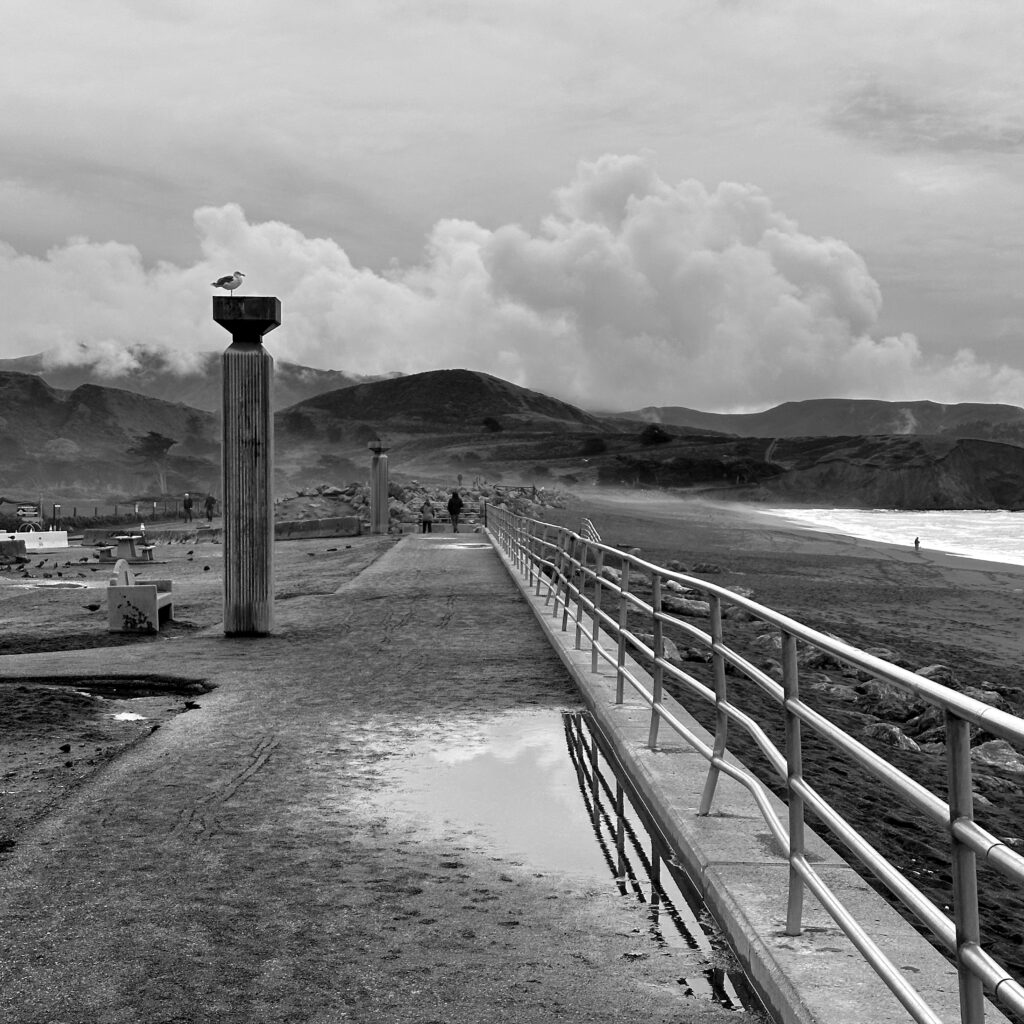Coastal Act Requires Strict Protection from Harmful Seawalls
Students with UCLA’s Frank G. Wells Environmental Law Clinic are giving testimony before the California Coastal Commission on a critical issue.

As coastal communities up and down California contend with sea-level rise, they’re facing tough decisions about how to update their land use plans. One of UCLA Law’s environmental clinics is helping lead the way.
Over the last several months students in the Frank G. Wells Environmental Law Clinic, Maeve Anderson, Mackay Peltzer, and Jacqueline Diaz Madrigal, have been working on behalf of the Surfrider Foundation to research and analyze the City of Pacifica’s new Local Coastal Land Use Plan. Today, the students will join Surfrider and members of its local San Mateo Chapter to testify before the California Coastal Commission on a proposed updated Local Coastal Land Use Plan for the City of Pacifica.
Pacifica is a small coastal city and popular surfing destination located between San Francisco and Half Moon Bay. Pacifica is requesting the Commission certify the first update of its coastal land use plan since it was initially adopted decades ago in 1980. The new plan will be one of the first in California to contend seriously with sea-level rise. The UCLA student team compared two versions of Pacifica’s plan to identify how it had evolved in response to past feedback from Surfrider and other stakeholders as well as the Commission, and conducted a legal analysis of the proposed plan. To become effective, Pacifica’s plan must be approved by the California Coastal Commission, and later today, Anderson and Peltzer will testify at the Coastal Commission’s public hearing to consider the plan.
The students’ testimony highlights concerns about the Pacifica plan’s permissive use of “armoring” along the coast, which Surfrider opposes. Armoring — which includes constructing rock revetments and seawalls along the coast — may protect private property, but depletes beaches over time, eventually eliminating the possibility of much coastal recreation, reducing access to the coast, and harming marine environments. Such impacts infringe on the public’s rights under the public trust doctrine, enshrined in the California Constitution. Here, the Pacifica plan proposes to designate areas called Special Shoreline Resiliency Areas (SSRAs), where the city will allow for armoring that breaks with past practice and violates the California Coastal Act. The Coastal Commission’s staff report on Pacifica’s plan acknowledges as much, stating, “the proposed SSRA provisions are inconsistent with the Coastal Act’s limits on shoreline armoring, which direct their denial.” But rather than direct their denial, the Coastal Commission staff report attempts to justify this violation, relying on the Coastal Act’s conflict resolution provisions, and other purely speculative impacts should SSRAs be denied.
The students’ and Surfrider’s testimony contend this is legally unsound, noting instead that the Coastal Act’s conflict resolution provisions require conflicts to be resolved in the manner “most protective of significant coastal resources,” which courts have consistently interpreted to mean public-serving, and typically natural, resources. The students and Surfrider argue that applying that reasoning can only lead to denial of SSRAs and their perpetuation of harmful armoring.
The testimony of these students from the UCLA Frank G. Wells Law clinic — which Emmett Institute Deputy Director, Julia Stein, and I taught this semester — contributes legal analysis at a crucial time. At stake are major decisions about how California municipalities will deal with sea level rise, how seriously they will take climate adaption, and what they are willing to exchange to protect coastal property. Pacifica is one municipality, but its coastal land use plan is expected to set a precedent for other California municipalities and the Coastal Commission’s treatment of Pacifica’s plan will set the tone for California’s approach to climate adaption in the context of sea level rise.
Reader Comments
One Reply to “Coastal Act Requires Strict Protection from Harmful Seawalls”
Comments are closed.






Years ago, I co-authored, with Meg Caldwell, a law review piece on why sea walls like this violate core protective laws. So glad to see the clinic in action putting similar ideas to good use!